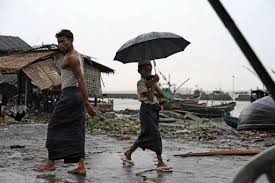A threat by Rangoon chief minister Myint Swe to prosecute news media that cover the current sectarian violence in the western state of Arakan in an irresponsible manner has highlighted the fragility of recent improvements in media freedom. Myint Swe issued his warning during a news conference on 10 June in which he accused the media “enflaming the conflict” in Arakan.
Speaking at the same news conference, Gen. Tint Swe, the head of the Press Scrutiny and Registration Division (PSRD) told the media that all news reports would have to be submitted to his department before publication, in effect restoring the system of prior censorship in effect under the military junta that handed over to a civilian government last year.
Despite an increasing military and police presence, the tension continues to mount in Arakan with a new outbreak of violence on 10 June that left five wounded. The clashes were sparked by the discovery of the body of an Arakanese girl, an apparent rape victim, on 29 May in the village of Maung Taw.
“This marks a very disturbing step backwards by the government in its dealings with the media, especially as Tint Swe had previously said the PSRD would cease to exist at the end of the month,” Reporters Without Borders and the its partner organization, the Burma Media
Association, said. “The threat of criminal prosecutions against journalists and the reimposition of censorship are unacceptable.
“The latest developments have proved that freedom of information can in no way be taken for granted. We have for months been saying that this freedom cannot just be regarded as a consequence of democratization. It also as an essential condition for it. The current conflicts show this. A legal framework and protective measures for media freedom must be adopted. The role of the media in crises of this kind is essential. While they should be reminded of their duties and responsibilities, their right to report the news and move about freely must not be obstructed.”
The two organizations added: “The media have tried hard to provide good coverage. But they lack legal protection and institutions capable of providing leadership, the resources available to them vary a great deal and some media and journalists are relatively inexperienced. It is up to news organizations to remind their reporters of the rules of professional conduct and, above all, to protect the ones they send to cover conflicts.”
During the news conference, Myint Swe said media that covered the unrest in a manner that threatened “the stability of the state” could be prosecuted under Section 5 of the Emergency Provisions Act and Section 505 (b) of the Penal Code.
Under Section 5 (j) of the Emergency Provisions Act, actions that “affect the morality or conduct of the public or a group of people in a way that would undermine the security of the union or the restoration of law and order” are punishable by up to seven years in prison.
Under Section 505 (b) of the Penal Code, actions “with intent to cause, or which is likely to cause, fear or alarm to the public or to any section of the public whereby any person may be induced to commit an offence against the State or against the public tranquillity” are punishable by up to two years in prison.
According to the exile newspaper Irrawaddy, Myint Swe told the print media that “you should be aware of your responsibilities rather than just being competitive with your rival journals.” The government-controlled New Light of Myanmar newspaper has meanwhile urged journalists to tone down their reporting and to cover the conflicts in a tolerant manner.
As announced, the government has reestablished its strict control of news and information by means of prior censorship by the PSRD. Media that fail to submit their articles before publication will be punishable under the Printers and Publishers Registration Act, a law introduced by the late dictator Ne win.
The civilian government had announced changes to the legislation governing the media but they have yet to see the light of day. They include the creation of a Press Council that would be part of the information ministry and would replace the PSRD, which acted as a censorship office.
Information and culture minister Kyaw Hsan’s announcements about the proposed Press Council were nonetheless criticized by journalists. The first draft of the proposed new media law was based on 1962 legislation, envisaged applying penalties taken from the Penal Code, and only concerned the print media. A second version is currently being drafted.
Democratic Voice of Burma, an exile radio and TV station, has issued the following list of 10 recommendations to its reporters and editors. If followed, the recommendations would help to ensure balanced coverage of the unrest in Arakan:
- 1. Stories should not enflame tension.
- 2. Avoid using racial or religious terms.
- 3. If it is unnecessary, do not mention religious or racial background.
- 4. Quote people who are respected by both sides in the conflict. Use quotes from respected religious leaders.
- 5. Never use just one source for a story. Use sources from both sides and one independent source.
- 6. Clearly spell out what is not known and what cannot be confirmed.
- 7. When using a quote from a member of the government or other official, check with another source and if this is not possible, say that the information could not be verified independently.
- 8. Do not quote extreme racial or religious statements by either side.
- 9. Be aware of the possibility that the government or a group within the government is creating the conflict and using the media to drive their agenda.
- 10. Stories from reporters must be approved by the person in charge, or by editors, before going out on air.
No comments:
Post a Comment